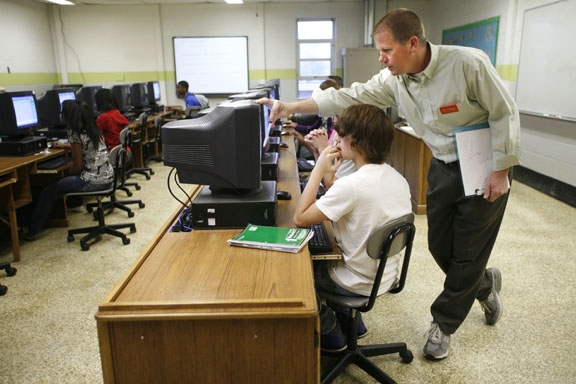
Bill Johnson helps freshman Hubert Gibbs during his Algebra I lab at Hopkinsville High School (Christian County). The students were using the Cognitive Tudor software. Johnson served in the Navy for 10 years. After later working in the private sector, he completed the Troops to Teachers program to earn his teacher certification. Photo by Amy Wallot; April 2011
By Susan Riddell
susan.riddell@education.ky.gov
After a 10-year stint as a U.S. Navy nuclear propulsion engineer, Bill Johnson went to work in the private sector for another 13 years as an auditor, information security manager and procurement director.
Wanting to spend more time with his family before his children head off to college, Johnson decided to finish something he looked into almost a decade ago: becoming a teacher.
Now he’s one of more than 300 teachers in Kentucky who participated in Troops to Teachers (TTT), a federally-funded program that assists eligible military personnel to transition to a new career as a public school teacher in a high-need school.
“I first got involved (with TTT) in 2002, but private sector opportunities were attractive,” Johnson said. “Last summer I was looking for a lifestyle change … so I decided to finish the Troops to Teacher process by taking the PRAXIS for business and math.”
Last December, Johnson began his education career teaching Algebra I and II and geometry at Hopkinsville High School (Christian County).
Wayne Eccles, program coordinator for TTT, said participants must have at least a bachelor’s degree in the content area – or a closely related content area – to be eligible to teach in a Kentucky classroom.
“Many have completed one or more master’s degrees,” Eccles said. “Multiple master’s degrees are more common than you would think. I have two participants with academic doctorate degrees and two or more with juris doctorate degrees.”
All TTT participants must pass one or more PRAXIS (competency exam) administered by the Education Testing Service. Upon meeting all requirements and passing the required PRAXIS, a statement of eligibility is issued, Eccles said. Once hired, they receive Provisional Teacher’s Certificates and go into the Kentucky Teacher Internship Program (KTIP).
Eccles said the certification process can take between three months and four years depending on the route to certification and the participant’s previous education.
KTIP provides additional mentorship and instruction for all beginning teachers, Eccles added.
Following a 20-year Army career, Larry Fohl has taught 7th-grade social studies at West Hardin Middle School (Hardin County) for three years.
He was hired days before the start of the 2008-09 school year and admits to questioning his decision to enter the classroom.
“Because I had been hired right before school began, was not educated as a teacher, had not student taught and was KTIPing, I had a lot of catching up to do and was working 60-70 hours a week,” Fohl said. “My student-management skills were not that great my first year either. Managing a class of 30 12- to 13-year-olds was challenging, and while much of what I learned in the military was applicable, there was also a lot to learn in this area.”
He became more at ease in the classroom in his second semester, and that trend continued into his second year as he blended a strict yet approachable teaching style.
“The students responded well,” Fohl said. “I am in my third year now and feel comfortable.”
His teaching style isn’t the only benefit his military background has afforded him.
“I felt very comfortable with content knowledge from the beginning, and much of that confidence came directly from my military travel and experiences,” Fohl said. “The military emphasis on team building, mission orientation, can-do attitude and morale building also are advantages.”
Eccles agreed.
“The aspects of the military that are most common in the school setting are leadership, collaboration, empowerment, teamwork, mission accomplishment, assessments and after-action reviews (AAR),” Eccles said. “An after-action review is just what it says. After an operation or exercise the leader facilitates a conversation about what worked well, what didn’t work well (referred to as plusses and minuses) and what we can do to improve the next time. As a JROTC instructor, I used this at the end of every exercise. Every one of those kids who experienced the AAR has the knowledge of how to run one and most got an opportunity to lead one.
“The military has used mission and vision statements for many, many years,” Eccles added. “Now, schools and districts use them as well. The mission and vision should drive training in the military and should shape educators’ efforts.”
Like Fohl, Johnson brings his military persona into the classroom at Hopkinsville High.
“It’s a strong focus on good order and discipline followed by high expectations for student performance,” Johnson said. “Learning is not a choice but rather a requirement in my classroom.”
Johnsons said he’s learned a lot from fellow teachers, too.
“Like all previous jobs, I enjoy being part of the team,” Johnson said. “I have noticed that my frame of reference from the military and private sector is often different from their perspective as career teachers. It is enjoyable to challenge each other on different and new ways of thinking about education.
“Most of my learning has come from working with the special education teacher for math,” Johnson added. “Helping with techniques and ideas to reach students who are having a difficult time with math has been a learning process. Additionally, observing reward techniques used by other teachers has been useful as a positive way to get the desired results.”
Teachers in the Troops to Teachers program have the same expectations of them as traditional teachers, and they are guided by the same standards in the classroom, Eccles said. “Each teacher brings his or her own unique experience and background into the classroom,” Eccles said. “All teachers do.”
Though military concepts are directly transferable to a career in education, there is still much to learn. That’s something Fohl realized once he entered the classroom.
“Your mature, proven judgment and experience-driven wisdom are advantages, but many of us were mid- to upper-level leaders in our service, and we are starting all over at the bottom of the education hierarchy,” he said.
Even with starting over, it’s a decision Fohl is glad he made.
“As clichéd as it sounds, the best thing about teaching is the kids,” Fohl added. “They are fun and funny. Even the unmotivated and discipline-challenged kids are enjoyable. Those two groups are tougher, but also more rewarding when the bulb lights up.”
MORE INFO …
Wayne Eccles, wayne.eccles@ky.gov, (888) 598-7667
Bill Johnson, william.johnson@christian.kyschools.us, (270) 887-7050
Larry Fohl, larry.fohl@hardin.kyschools.us, (270) 862-3924





Leave A Comment